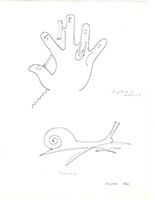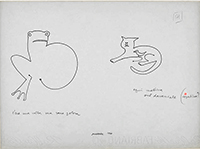(Milan 1907 – 1998 )
STUDIES FOR ILLUSTRATIONS, 1960
Pen and black ink on wove Fabriano paper. Titled and signed in pencil in mezzo al prato / ambarambà (copertina?) MUNARI 1960. 325 X 240 mm.
The sketches were used to illustrate Nico Orengo's collection of nursery rhymes A-Ulì-Ulè, published in 1972.
Bruno Munari was born in Milan in 1907. He began his career at an early age during the second wave of Italian Futurism, exhibiting his work for the first time in 1927 at Galleria Pesaro, Milan. In the years following, he progressively moved away from the influence of Futurism, developing an extremely personal and singular project over the course of 70 years. Much of Munari’s work is characterized by a pedagogic interest and a radical vision of expanding man’s understanding of the world through the development of new forms of visual communication. In 1948 he founded the MAC, with Monnet, Dorfles and Soldati. His personal exhibitions are numerous and inventive: in 1949, at the Salto Library in Milan, he presents the "Useless Machines" and, in 1950, "Illegible Books"; in 1951, at the Helicopter Room in Milan, he exhibited the "Collection of found objects"; in 1952, at the Bergamini Gallery in Milan, his "Plastic Square Paintings" are on display. In 1950 Munari started the paintings "Positive Negative" which he exhibited, the same year, in Paris. He also participates in numerous group exhibitions: like that, in 1952, at the Helicopter Room with "Plastic materials in concrete forms" with works in celluloid, plexiglas, plastic laminates. In April 1954 he worked with Dorfles on the exhibition "Color for car bodies" held at the Turin Motor Show. Munari is, the same year, among the members of the Italian Groupe ESPACE. In the course of his experience, his production of design and his studies on the identification of art, play and creative learning, while respecting the intelligence of the child, take on international importance.


